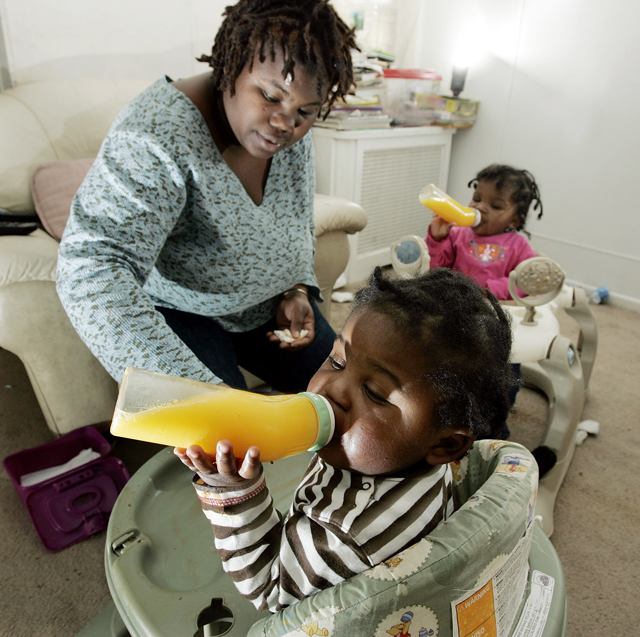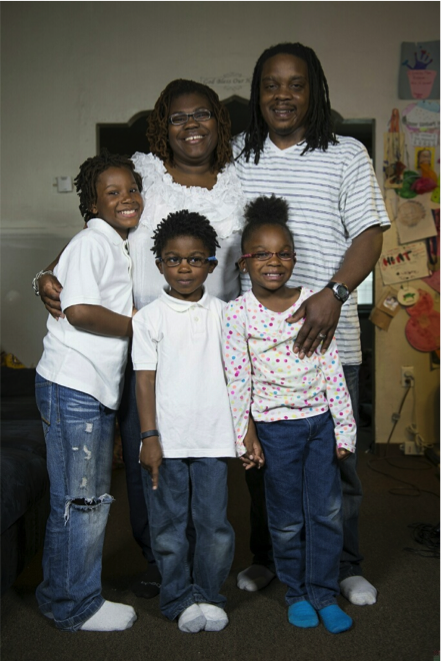
Tianna Gaines-Turner watches as her twin toddlers Marques, left, and Marianna Turner (at the time, both only 1 year old) have juice, Feb. 26, 2009, at their home in Philadelphia, PA. (AP Photo/Mel Evans)
Tianna Gaines-Turner, a child-care worker from Philadelphia, presented these three suggestions to Congress this week during the House of Representative’s latest hearing on the War on Poverty. What makes Gaines-Turner’s testimony different is firsthand experience. Gaines-Turner and her husband have struggled for years to escape poverty while raising their children — a 10-year-old son (who, she proudly noted, was on the honor roll), and two 6-year-old twins. Both parents work: Her husband is employed at a grocery store for $8.50 an hour, and Tianna leaves home each day at 7:00 a.m. to take care of children aged 4 to 16 for $10.88 an hour. Nonetheless, her family struggles to make ends meet and put food on the table. Twice, Gaines-Turner, her husband and their three kids have been homeless.
The House Budget Committee has been conducting hearings on poverty and the safety net since last year — Paul Ryan (R-WI), the committee’s head, has often declared that LBJ’s War on Poverty, now fifty years old, failed and must be replaced. Thursday’s was the fifth. Gaines-Turner was the first poor person to testify. She did so through the Witnesses to Hunger program.
Three recommendations for solving poverty
1. Provide living wages and family-oriented labor policies
I think we all agree: To get out of poverty, America needs jobs that pay a living wage.
Notice that I am not just saying we need “jobs;” we need “work.” We already have jobs, and they’re not enough. I am saying we need good jobs that pay the value of your work. So many American families are working — working full time, or cobbling together several jobs. But working families often cannot afford to pay rent; and sometimes they cannot afford to pay for food. I am talking about the working hungry. My friend Whitney has talked about being so hungry while she was taking the bus to work that the pain was unbearable. This should not happen in America.
America needs good jobs. Here’s how to do it:
- Give good tax breaks to companies that provide stable employment.
Companies need to stop the practice of hiring people part-time so they can profit more by not paying for health benefits and sick leave. So many hungry families have unstable jobs with unpredictable work hours. This practice must stop. Congress can help change this.
- Incentivize companies to provide paid sick leave and family leave.
When my son was sick, I had to stay at the hospital with him, so I couldn’t go to work; my husband had to stay home with our twin babies, so he couldn’t work. Here’s the problem: neither of us had paid sick leave, so we lost hours on the job, and we lost pay, too. The result was we could not afford to pay our rent on time, nor our light bill. From there, we became homeless. Imagine the stress our family felt. We need to see moms and dads less stressed about whether or not they’ll lose their job or their home when they have to take care of their children when they are sick. With paid sick leave, we’d see healthier, more productive working families throughout the nation.
- Subsidize affordable, high-quality child care.
Safe, affordable, quality child care is hard to come by in our communities. This makes it very difficult for parents like me to find steady work, or go back to school to further our educations. Child care for very young kids, and high-quality preschool for all 3- and 4-year-olds, should be a top priority for Congress. By high quality I really mean high quality. Early in his life, my son was diagnosed not only with asthma, but also with epilepsy. My husband and I could not find affordable qualified child-care providers. We suffered as a result. Providing for good quality affordable child care would not only help build a smarter, more successful next generation workforce, but will also help parents secure employment and support their families today. It makes today’s workforce perform better for America.Start by giving Head Start and Early Head Start enough money to reach all eligible families.

Tianna Gaines-Turner, center, and her family. (Photo courtesy of Witnesses to Hunger)
2. Invest in a safety net that supports and promotes economic mobility
I think companies that pay low wages should raise their wages, so that my family wouldn’t have to rely on government benefits. In the meantime, do not cut nutrition, housing or health care assistance programs. They keep America healthy.
Nutrition Assistance: One half of the people getting SNAP are kids. And 70 percent of two-parent families like ours that are getting SNAP are working. Without SNAP, my kids would go hungry; their health would be even more at risk. If you cut SNAP, you hurt America’s kids and you cripple America’s workforce
- Increase the SNAP allotment.
The SNAP allotment should be larger so families do not run out of money for food before the end of the month. The Institute of Medicine did a study on the adequacy of the SNAP allotment. They proved that the allotment is not enough. People receiving SNAP have been saying this for years. But no one was listening. Now that the Institute of Medicine says it, maybe Congress will listen.
- Keep WIC as is.
WIC is an excellent source of good nutrition for pregnant moms and young kids. WIC has helped many of my friends and their kids. I know that it prevents low birth weight and it promotes child development.
Housing Assistance: My family and I have been homeless twice in the last several years. During this time we had also been on the waiting list for Section 8 (housing choice vouchers) for over 10 years. When we were homeless, we were very stressed. You can see it in my kids’ faces here. After much hardship, we were finally able to move into a house in Frankford.
Health Care: My husband and I make too much money at our jobs to be covered by Medicaid, but our jobs don’t provide health-care coverage. For years we were uninsured. It was stressful. We had medical bills we couldn’t pay. If we could, we avoided going to the doctor at all. Just recently, we were able to get health care through the health care exchange. We are grateful for this coverage. It’s especially important as I have epilepsy and high blood pressure. Now that I have health coverage I know that I can be more productive. I won’t lose more days at work, and won’t lose money because I am missing work. I’ll also be able to take better care of my kids.
Improve the overall safety net in five ways
- Invest in 21st century technology and customer service.
I want to be really honest with you. The experience of applying for and maintaining public benefits is often painful and frustrating. Overall, case managers lack training in basic civility and kindness. They are also using technology that is not suited to the modern day. We need to move into the digital age, and there should never again be times where case managers shrug their shoulders and say they lost paper documents. Nor should a busy, working family be asked to hang on to tiny little paper receipts for years on end.
- Fix the cliff effect.
Let me tell you something that everyone who has ever been on public assistance knows. When families start to make a little bit more money on the job, they lose benefits too quickly. It creates an economic shock. Then families are worse off. This makes it practically impossible to build our way out of poverty. We need to fix the system so that we can get out of poverty. My friend Barbie experienced this firsthand when she got a job helping people apply for SNAP benefits. She was so happy to finally have stable — and fulfilling — employment. But her small increase in wages made her lose benefits so quickly that her family felt the effects of hunger more severely than before. This falling off the cliff caused her great depression and stress and more suffering for her kids.
- Invest in educational opportunities through the safety net.
The “Work First” policy doesn’t work. “Work First” to us means pushing us into low-wage jobs that get us nowhere, with no hope for a future, no hope for escape from poverty. There are not enough opportunities to improve our educations so we can make better wages. My friend Quanda from Boston was on cash welfare. She was just one credit away from finishing her college degree in early childhood education. Her caseworker told her she had to withdraw from college, or she would lose her cash assistance. They forced her into a training program for a low-wage service job. This is the wrong message, and the wrong thing to do. We need to invest in more educational opportunities that help move people out of poverty.
- Promote savings so that families can build their own safety net.
I’m going to tell you the truth. I didn’t have a bank account until a few years ago. I didn’t have one because I was afraid that our caseworker was going to take away the tiny bit of help we were getting to feed our family. I had a fear of saving a little money. We need to get rid of asset limits so that the case managers won’t scare us into hiding the tiny bit of money we make. People need help. They need encouragement. They need a program that is actually built to create economic mobility. Everyone who receives public assistance should be encouraged to save money. Each county assistance office should create opportunities for savings accounts and should promote entrepreneurship.
- Find solutions with a real task force.
I recommend that you invest funds into a special task force that has state administrators, public assistance recipients and employers. This task force would work to identify the barriers in our systems, and build something better to create mobility.
People living in poverty — those who were born into it, and those who are down on their luck — want to get out of poverty. We want to create our own safety nets, so we never have to depend on government assistance again.
3. Invest in community solutions, run by people who know poverty firsthand
People who are poor work so hard, and we do so against all odds. We use our wits, our strategy and our brilliance to survive and to feed our kids. We are great entrepreneurs.
This is why the most important thing that Congress can do is to create a system where people who are poor can work together to create their own solutions to poverty. People who live in poor communities should have official positions on community and state advisory boards that oversee the effectiveness of state and federal programs. Congress needs to think of people receiving benefits as expert shareholders. This brings me to my third recommendation: invest in the expertise of poor communities.
One of the most important aspects of the War on Poverty was the emphasis on the participation of people who are poor themselves. Back in the 1960s and early 1970s the federal government had the foresight to release funds through the Office of Economic Opportunity (OEO) to low-income communities to ensure that that people who were living in poverty could be involved in developing solutions. But that money was taken away during the Reagan years, and later. This has created more difficulty for families born into poverty. It makes it seem to us that our policymakers want to keep us poor and uninvolved, and I am sure this is not true.
I suggest you start with the $8.5 billion dollars that was taken from SNAP in the Farm Bill and invest it around the country to encourage low-income communities to run health centers, feeding programs, screening programs and to partner with community-based organizations and state agencies to improve programs that are already in place. It will have the greatest return on your investment, because it will ignite brilliant ideas from people who know poverty, and who have a strong personal interest in ending poverty for good.
I am not talking about what you call “block-granting.” I am talking about added funds that are invested to ensure that there is accountability to people living in poverty at the local, state and federal levels.
Conclusion: Nothing about us without us
Congress should not make any decisions about programs meant to help families living in poverty without people who know poverty first hand at the decision-making table.
Thank you for having me speak today. Today is a bold first step. But we need to see more. There should be no bill passed, no law passed without a strong analysis of how it will affect family poverty and how it will affect child hunger.
When the Budget Committee meets again, I promise that my colleagues from Witnesses to Hunger, and our partners from across the country, will be happy to work with you to identify solutions to American poverty. Poverty is America’s most urgent security issue.
It’s time to call in the experts. My family, my neighbors and people like me know the solutions.
Thank you for inviting me in. I am happy to help.


